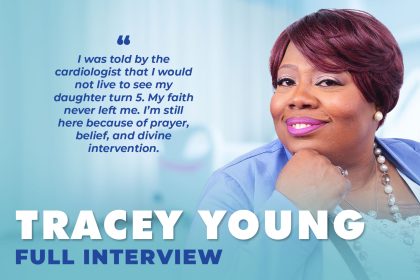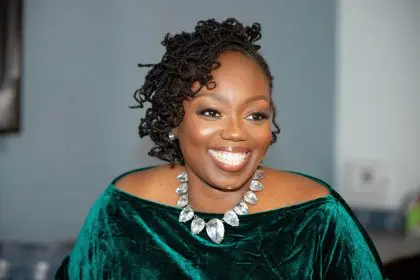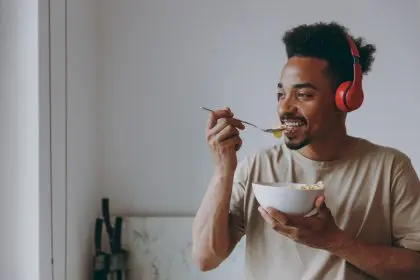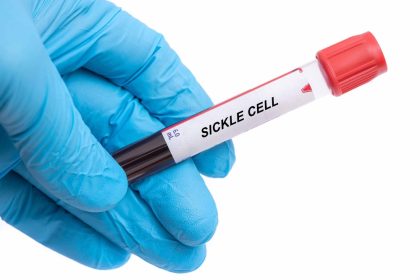Eva D. Coleman, a multimedia powerhouse with over three decades of experience in television, radio, and print journalism, has added another remarkable chapter to her story: breast cancer survivor. As a Telly award-winning producer, educator, and leader in the National Association of Black Journalists, Coleman has long been a voice for her community. Now, she’s using that voice to spread awareness about breast cancer, drawing from her personal experience to offer hope and guidance to others. In this candid interview, Coleman shares her journey, emphasizing the importance of early detection, faith, and community support in facing breast cancer head-on.
[Editor’s note: This is a truncated transcribe of a longer video interview. Please see the video for the extended version. Some errors may occur.]
What can you share about being fearless as it relates to breast cancer?
First of all, breast cancer is not a death sentence. That’s what I always like to start with. If it’s caught early, the chances of survival are great, and that was my case. It should not be something we cringe at but something that we push forward and get through.
How do you suggest women surround themselves with warriors of faith after a diagnosis?
Your faith is everything. It is what will help you push through, go through it, and get through it—all of the things. It’s like you have to be rooted in your faith, and having a mindset of survival, starting with that, is key. Then you surround yourself with a village of supporters who will be your champions, who will be your cheerleaders, who will help you get through it as well. Make sure that you have phenomenal health care providers that you trust, because it is your life that’s at stake. So make sure your entire tribe is a formidable force to be reckoned with.
What are the critical components of supporting a woman who has been diagnosed with breast cancer?
Someone who’s been recently diagnosed—I would first say, please eliminate negative speak. Please do not speak negatively over their situation. Only speak positively; retrain your brain. That also involves your facial expressions and your nonverbal body language, too. Make sure you don’t go into a situation where you’re sulking or expressing any type of negativity. That’s number one.
Number two, let them know that you have their back and are there to support them throughout the entire process. Make sure you have their best interests at heart and the best interests of their family. It’s not just the individual who’s diagnosed; if they have a spouse or children, that family is going through it as well. So being a strong source of support for the entire unit is very important.
Number three, if you can, go to a doctor visit with them. Even if you’re sitting in the waiting room while they’re at their appointment, just knowing that you are there and by their side, walking them through this process, is a tremendous support and help.
And four, once the treatment plan is done, successful, and over with, make sure that you continue to check in. Don’t just be with them through the process—check in and check on them periodically long after their journey is complete.
What should journalists be doing to raise awareness about breast cancer through Black voices?
I think one of the things is what you’re doing right now, Munson, and what you’re doing with Rolling Out: making sure you talk to people who’ve been through it, share our stories, our stories of survival. Also, I think being realistic about how, depending on the stage of diagnosis, the reality of survival—it matters. Not everyone comes out on the other side; they may come out in heaven if it’s a late diagnosis. Being realistic about it is very, very key.
Sharing the stories, treatment options, and new innovations in health care is crucial as well. Health care has come a long way, and there are so many innovative approaches and treatment plans out there that people may not even know about. My breast cancer journey is not the journey of someone 10 or 20 years ago. The journey is different; the options are different. Making sure that we keep up with those innovations and share them is important.
As journalists, we want to implore our community members to make sure they get tested, get those mammograms, and get tested often. I know sometimes when people get the news of potentially having breast cancer—not even a diagnosis—they kind of freeze, clam up, sulk, and don’t want to go forth in the process. But no, this is not the time to sit in the corner and cry; this is the time to say, “I want to do whatever I can to fight this thing.” Follow the doctor’s orders, get the biopsy done, and go in full force without fear. As long as you have God on your side, He’ll handle the rest. But you have to make sure that you attack it quickly to be able to get on your journey and be done.
How important is it for women to test and talk about testing with their friends?
Hey, you gotta get the mammograms. That’s what they’re there for. Some health care providers may delay the time—they may say, “Oh, you don’t have to come back for two or three years.” But I think if you have a likelihood or family history, it’s even more crucial to get tested. Demand what you need to get the answers you deserve. Make sure you get the mammogram. So many women do not; so many women just don’t find out, or they don’t want to know.
That’s a mindset we have to shift in our communities. We have to face these diagnoses without fear. There’s a plan for all of our lives, and that testimony you can give by going forward, getting the mammogram—if you are diagnosed with breast cancer, make sure you document and share all the steps to get through your journey. Share that “Yes, I’m a survivor. I survived this thing. I made it,” but it was because I got mammograms every single year. I still get them, and now I have to get them more often since I had breast cancer. But I was vigilant in getting my mammogram every single year, and that’s why it was caught early. When mine was caught, it was stage one, and I knew that was an early catch.
I knew it was major, but not as bad as it could have been, because I didn’t have it last year—it didn’t show up last year. So, I knew my chances of beating it were fairly good. It was an aggressive, fast-growth tumor, though, so I had to do surgery first, then radiation and chemotherapy.
Another thing is that everyone’s treatment plan is not the same. Some start with chemotherapy, then radiation, then surgery—or radiation, then surgery, then chemo. So don’t compare your plan to someone else’s. Work with your doctor to determine the best plan and sequence for your treatment. Don’t say, “Oh, mine wasn’t done like that.” Each individual is different, and your treatment plan may be different as well.
How did you approach the breast cancer conversation with your daughters?
The mother-daughter conversation for me was very emotional. Munson, I know I’ve shared this with you before—I lost my husband, their dad, to cancer 13 years ago. So for my daughters, it was like, “Here we go again—another cancer event in our family.” Me being a widowed mom, I sat my daughters down individually; I didn’t tell them together, because I wanted them to have their own space to process and not feed off each other in the moment. I felt that was important. If you have children, have individual conversations with them.
I was also very serious and intentional about letting them know specifics—letting them know how I planned to fight this thing. I didn’t plan to “go out like that.” I wanted them to know I was going to do whatever it took to continue being here to watch them become the successful young women they are. That was important to me, but the conversation is crucial. Be honest, be open, and don’t hide anything.
I know of a mother who hid her diagnosis from her children, and she ended up passing away. Her children didn’t even know she had breast cancer. That saddens me and hurts my heart, but some people handle things differently. There’s no judgment in how you handle it, but I think open and honest dialogue and communication with your children are key—with your entire family, whoever is in your support system. Let them know, because children are more resilient than we think. Sometimes we don’t give younger children the credit they deserve in handling tough situations, but they deserve that credit.
What are you celebrating now?
A: I’m celebrating being cancer-free. Yeah, it’s a year for me. This year, 2024—I’m cancer-free. I make sure to go to my doctor’s appointments. I go every three months; they have to do blood work and check my levels. I get mammograms every six months, and I have to keep that schedule for a number of years. But I’m just trying to live life to the fullest, cherishing every single day I have on this earth. Every day God allows me to wake up, I’m going to make the most of it—not taking any second for granted.












